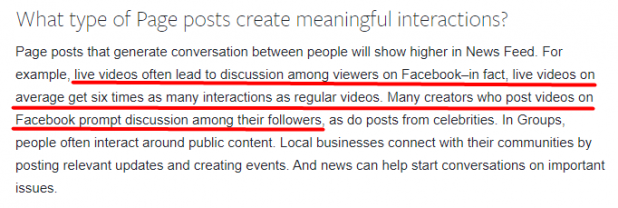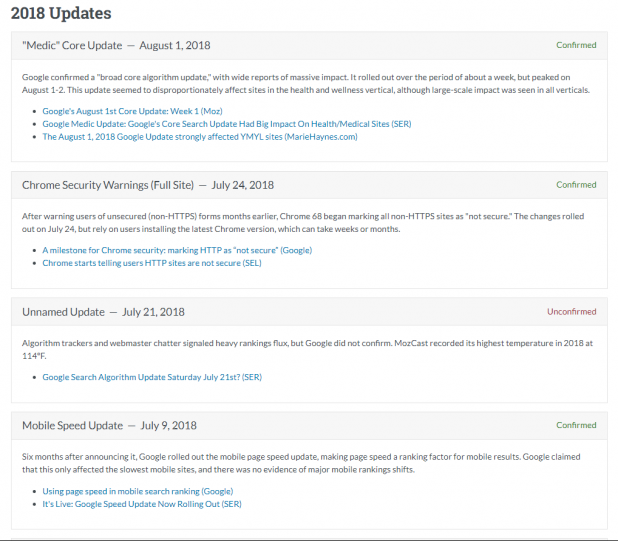SEO never stops evolving.
Just when you think you have all the facts straight, you learn something you were missing in your strategy, or Google updates their algorithm again, or you realize you’ve been slightly behind the curve.
So far, in 2018 alone, there have already been 12 major Google algorithm updates – confirmed and unconfirmed – and that’s not counting the regular, small updates they do daily.
The year isn’t over, either.
Keeping up has to involve keeping your finger on the SEO pulse, reviewing your strategy regularly, and implementing new best-practices in smart ways.
To help you stay on top of SEO in 2018 and beyond, I’m discussing the top trends influencing search engine optimization this year. Then, I’ll show you how these trends can move with you into the future, including how to incorporate key aspects into your SEO content creation.
2 Trends with Major Impact on SEO in 2018
Overwhelmingly, these are the 2 major trends impacting search this year:
1. Video Is Still Huge
This one is no surprise:
Video is still reigning supreme. Want proof?
YouTube is the second most-used search engine on the web (after Google, naturally – oh, and Google owns it). People spend 1 billion hours daily watching YouTube videos.
And, when given a choice between text or video on a web page, 72% of consumers would rather watch the video. It’s no wonder social platforms like Facebook are prioritizing video content in people’s feeds.

Video is a champion at getting people to stop, watch, and engage. For the foreseeable future, this probably won’t be changing.
2. Voice Search Is Taking Over
Another major tech trend that’s affecting search: Voice assistants.
You don’t have to type out your search queries anymore. Instead, you can use voice search to ask your Amazon Alexa, Google Home, or Apple device for information.
As this technology gets better and easier to use, more people are framing their search queries as natural questions, like what you would hear in conversation.
We’re not typing out “best ice cream Minneapolis” to find a good ice cream shop anymore. Instead, we’re asking our voice assistants something like this:
“Hey Google, where is the best ice cream shop in Minneapolis?”
And, pretty soon, it won’t be only savvy millennials and Gen-X-ers using voice search. With the way the industry is taking off, soon your grandma, your boss, and even your stodgy uncle will be using voice assistants – according to CNBC, by 2020, Amazon Alexa alone could be worth $10 billion.
How to Improve Your Content with Key Aspects of the Latest SEO Trends
With new technology paving the way, search is changing…
And it will keep changing. Here are some ways to integrate the latest trends that are affecting SEO for the long-term.
1. Use Semantic Keywords in Your Content
With voice search coming in strong, Google is keeping up – handily.
The algorithm is more sophisticated than ever, which means it’s more human-like than ever. This means, when ranking web pages, the search engine is looking for context.
Think of it this way: When you talk about a subject, you don’t repeat the same phrase over and over. It just sounds weird:
“Ice cream is delicious, but ice cream is difficult to make at home so ice cream tastes like what you get in the ice cream shops.”
That kind of talk will make anyone scratch their head and wonder if you are, in fact, a human and not a robot.
Instead, we’re more apt to use synonyms and related terms in our communication. This sounds natural:
“Ice cream is delicious, but this frozen treat is difficult to make at home so it tastes like what you get at an old-fashioned soda fountain.”
In the above sentence, I’ve bolded the related terms and synonyms. This is the kind of stuff search engines look for these days: Natural language surrounding our keyword, and putting our keyword in context with related phrases.
Luckily, you don’t have to think too hard about adding semantic keywords to your content. You probably write this way without even thinking about it – it’s human!
However, if you want to be positive that you’re sprinkling semantic keywords into your content, you can find them using the LSI Graph tool:


2. Embrace the Long Tail Keyword Phrase
Another byproduct of voice search: Keywords are looking longer than ever.
That’s because voice search queries are longer than regular search queries typed out via your keyboard. After all, most of us can speak faster than we can type, so we can and do use more words when speaking to our voice assistants.
Tap into this by lengthening your target keywords.
For instance, an average long tail keyword looks like this:
Vegan ice cream shop LA
But, when someone searches for that same information via voice search, the keyword stretches out:
What’s the best vegan ice cream shop in LA?
Include the entire phrase in your content, and you’ll be keying into the people who are voice searching for this exact topic.
The best part: The query is already worded in natural language, so it’s effortless to insert this type of long tail keyword phrase into your content.
3. Use Conversational Writing
This tip is simple.
People are searching using natural, conversational language more than ever. To appeal to this new wave of search queries, make sure you write your SEO content using a conversational tone. (If you don’t know how to switch up your tone, learn how – especially if you expect to be a profitable SEO writer.)
For example: Imagine your persona is sitting across from you as you write. Write what you would say if you could speak to them.
Here’s a big tip to achieve this – use more contractions. In conversation, you probably don’t say things like, “I cannot understand” or “Why is she not paying attention?”
That’s a very formal way of speaking and writing. Instead, use contractions like mad:
“I can’t understand.”
“Why isn’t she paying attention?”
Trust me, you’ll sound 100% more natural and down-to-earth.
4. Answer the Questions Your Audience Is Asking…
To make sure you’re targeting the right long tail keyword phrases, you have to answer the questions your audience is asking in your content.
But, how do you find those questions in the first place?
You need to do a little digging. Try any of these methods:
- Search for your industry niche on Reddit and check the forums for common questions.
- Check the comments and comment threads for related industry blogs.
- Check social media for relevant hashtags, then research what people are talking about in their posts and comments.
- Have an old-fashioned conversation with a customer, prospect, or colleague.
5. And Maybe Record Your Answers, Too
If you haven’t plunged into video content yet, now is the time.
If your resource pool is shallow, keep it very simple. Do a short text intro with your logo set to some royalty-free music, then fade into a clear shot of you.
Answer those questions you discovered from tip #4. Be as clear as possible. If you need to, refer to an outline so you hit all the points you want to cover. (To avoid sounding stiff, don’t rely on a script.)
Keep the video short and sweet, upload it to your channels, and see what happens.
Of course, if you have more resources (like a graphic designer and video editor), you can get more creative than this, or even outsource your video creation entirely.
Just remember – video isn’t the right content type for every creator. If you don’t have fun making video content, it might not be for you. If you force it, your viewers will see straight through you.
Step into the SEO Future and Make Your Mark
If you’re stalling on stepping into the major SEO trends, it’s time to quit waffling and get researching and creating. And, learning how to write accurate, on-point SEO content.
These trends are fast becoming mainstays of the current SEO climate. If you invest a bit now, you’ll be ready for the next wave of change coming down the pipe.
Don’t get left behind – stay in the game. You’ll be glad you did.







